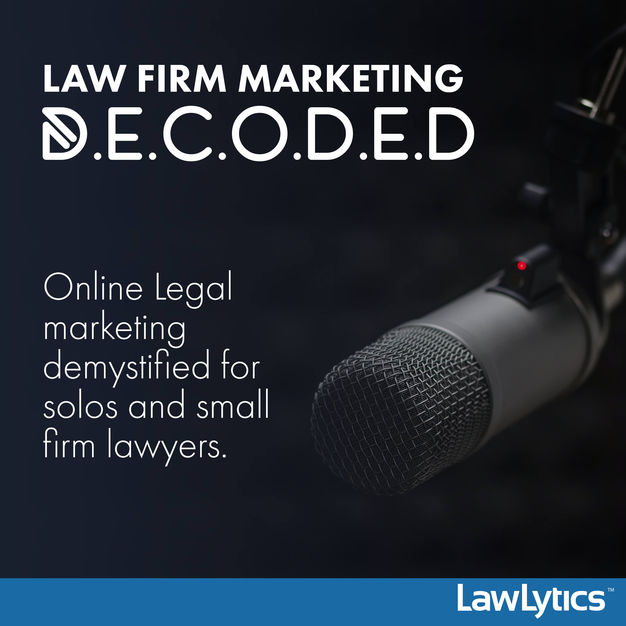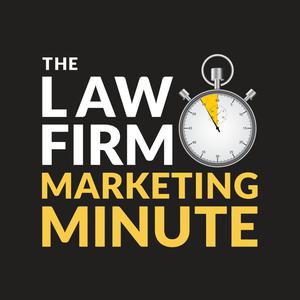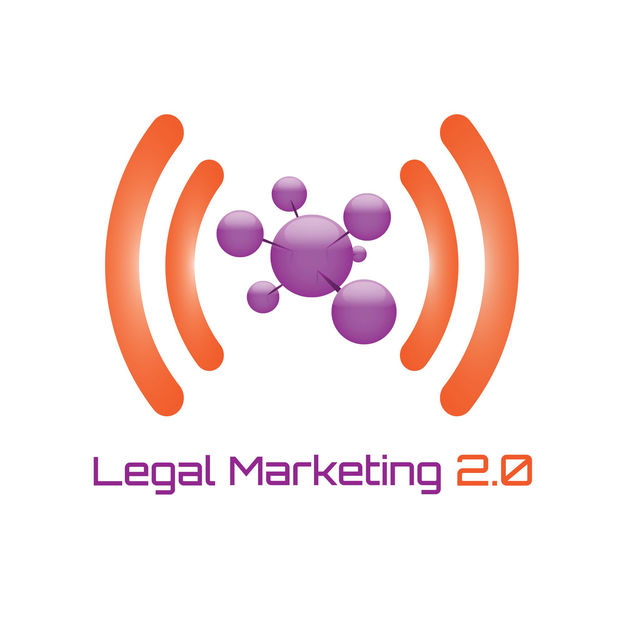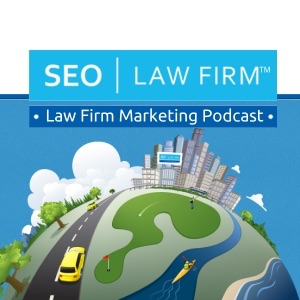
Law Firm Marketing Decoded
LawLytics
Online legal marketing demystified for solos and small firm lawyers.
- 12 minutes 39 seconds6 Reasons You Should – And Shouldn't – Have More Than One Website
For most small law firms, a single website will satisfy your digital marketing needs. In some cases, however, it can be a strategic marketing decision to have multiple websites. Whether you’re looking to target specific clientele, gain traction for a particular legal service, or cater to multiple languages, a second (or third) website could help you reach your marketing goals.
If you’re considering launching an additional website for your law firm, or haven’t yet considered this marketing strategy, it’s helpful to know all the facts so you can best maximize your time and resources. In this episode of the Law Firm Marketing Decoded podcast, we cover the reasons why you should – or shouldn’t – have multiple law firm websites and discuss other considerations for managing multiple sites.
11 September 2024, 5:18 pm - 7 minutes 51 secondsCore Elements of Effective Law Firm Websites: Mobile-Friendly Design
For the typical solo attorney or small law firm, what you need to have a successful law firm website is relatively simple and straightforward. However, it can be difficult to cut through the noise of greedy marketing agencies trying to sell you “quick fixes” or the endless number of self-help digital marketing resources for attorneys. In reality, there are three main pillars that make up an effective online presence: Good user experience, clear messaging, and mobile-friendly design.
In this podcast series, we take you through an in-depth exploration of each of these three pillars so that you can feel confident in your ability to achieve the success you wish to see from your website.
To listen to episode one, User Experience, click here.
To listen to episode two, Branding and Messaging, click here.
For our final pillar of powerful law firm websites, this episode of the Law Firm Marketing Decoded podcast discusses Mobile-Friendly Design.
19 August 2024, 5:25 pm - 12 minutes 11 secondsCore Elements of Effective Law Firm Websites: Branding and Messaging
In order to have an effective online presence for your law firm, you need to first understand what your website needs to be successful. Attorneys who are new to digital marketing can be vulnerable to predatory marketing agencies who tend to overcomplicate website management in order to sell you on pricey and unnecessary services. Oftentimes, their goal is to make your firm dependent on their services rather than to educate you on how you can achieve a powerful online presence easily and affordably. As a result, many attorneys find themselves stuck with agencies who don’t have their firm’s growth as their #1 priority.
Fortunately, digital marketing for attorneys doesn’t have to be complicated, secretive, or time-consuming. At LawLytics, we take pride in educating our members on how you can reach your growth goals using your law firm’s website and without having to stretch your budget. In this blog series, we cover the three pillars of powerful law firm websites so that you can get a better understanding of what your website needs – and what it doesn’t.
In this episode of the Law Firm Marketing Decoded podcast, we discuss pillar two of our three pillars of powerful law firm websites: Clear Branding and Messaging.
9 August 2024, 7:24 pm - 11 minutes 41 secondsCore Elements of Effective Law Firm Websites: User Experience
In today's digital age of running a practice, a law firm's website needs to be more than just a website in order to be effective. Today, potential clients expect to learn more about your firm, their legal issue, and potential solutions all within your firm’s website. What’s more, your clients expect a landing place for answers to their questions and other helpful resources they may need while working with you.
There seems to be no shortage of advice, tips, and best practices for attorneys to follow when it comes to managing their online presence, but in reality, there are three key things that every successful website has in common: Good user experience, clear messaging, and mobile-friendly design.
In this three-part Law Firm Marketing Decoded podcast series, we will be taking an in-depth look at each of the three pillars of powerful law firm websites individually. Listen here to learn about our first pillar of powerful law firm websites: User Experience.
26 July 2024, 4:29 pm - 18 minutes 51 secondsGA4 Data Essentials for Law Firms
Google Analytics (GA4) offers a lot of data, and you get it all for “free” simply by creating an account. That said, to sort through all these reports and find what you need is intimidating even for experienced marketers. GA4 is saturated with potential data points and loaded with customizable options that you could spend days (if not months) configuring.
In this episode of the Law Firm Marketing Decoded podcast, we share with you the right type of data to track including user acquisition, user attributes, demographic details, user engagement, and user devices. We also provide a smart solution to solo attorneys and small law firms who lack the time or technical capabilities to set up all the many reports in Google Analytics, which can be a daunting and confusing task for anyone without specialized training.
Tip: Refer to our blog to learn how to access the various reports we discuss throughout the podcast.
15 July 2024, 10:21 pm - 9 minutes 58 seconds4 Steps to Better Leads for Your Practice
Marketing agencies frequently tout hits, clicks, or impressions as the ultimate indicators of marketing success. However, solo attorneys and small law firms typically need a more specialized marketing approach that doesn't fit the standard digital marketing strategies. Focusing on localized, targeted marketing while maintaining a modest budget is usually the most effective strategy for small law firms.
In this episode of the Law Firm Marketing Decoded podcast, we will be discussing the importance of quality leads for legal marketing and the four steps to better quality leads for your law firm.
5 June 2024, 2:30 pm - 18 minutesShould My Law Firm Buy Google Advertising?
Acquiring new leads consistently, affordably, and reliably is one of the biggest challenges facing lawyers today. Most potential clients turn to search engines such as Google to find legal services and conduct legal research, yet it can be difficult to know exactly how to get in front of your ideal client online. Enter: The promise of Google’s paid advertising services.
For many, it can be advantageous to pursue paid advertising tactics to get a leg up on the local competition and makes for effective pairing with their law firm website. However, for solo attorneys and small law firms, it’s crucial to their marketing strategy to ensure that every advertising dollar is used efficiently or else it should be reconsidered.
In this episode of the Law Firm Marketing Decoded podcast, we will be discussing the risks and consequences of paid advertising, an analysis of Google Ads versus Local Services Ads (LSAs), and an argument for ad-free, content-based SEO legal marketing.
3 June 2024, 5:15 pm - 11 minutes 11 secondsGenerative AI Can't Do This for Legal Marketing
OpenAI’s ChatGPT remains the front-runner in AI tech and has been hailed as a game-changer across industries as the ultimate tool many lawyers can’t live or work without. From assisting in legal tasks to generating law blogs in seconds, ChatGPT has made its mark on the workplace.
However, generative AI is not perfect. In fact, one critical thing it can’t do for us is something critical to law firm marketing: Creating connections with potential clients. Legal services – whether you advise startup businesses, represent criminal defendants, or negotiate divorce settlements – are all about serving individuals, businesses, and other entities.
To serve most effectively and obtain favorable outcomes, lawyers need to connect with their clients by putting themselves in their clients’ shoes. In doing so, you can come to understand what they are experiencing and, subsequently, provide what they need. When this connection is conveyed in your website content, it has the power to convert leads.
To connect in this way, however, requires an emotional element. Generative AI lacks empathy – it is not yet capable of expressing or inciting emotion.
In this episode of the Law Firm Marketing Decoded podcast, we explore why empathic and emotional-based law firm website content is important and provide tips on how to create and benefit from it.
30 May 2024, 8:42 pm - 15 minutes 12 seconds5 Steps to Better Work-Life Balance for Attorneys
Our obsession with efficiency has skyrocketed in recent years with the help of technology, hustle culture, and various “life hacks” shared on social media. While these are all tools designed to save time, society as a whole only seems to get busier and busier.
Regardless of the industry, it’s a common goal among business owners to find a harmonious balance between their work life and their personal life, and attorneys are no exception. Legal professionals have also begun evaluating the way they work in favor of leaving outdated, inefficient practices in the past.
Remote work was once perceived as a solution to this life-work balance, but now it is on the decline overall. But here is where an exception may apply to the legal field. Solo and small law firms have a growing opportunity to take advantage of resources that can transition their practice from an expensive office-only model to a remote or hybrid model. Armed with the right tools and tech, attorneys across practice areas can improve their operations, dedicate more focus to delivering high-quality service to their clients, and scale their business – all while working less.
In this episode of the Law Firm Marketing Decoded podcast, we’ll explore the benefits of adapting a remote or hybrid model for your business, how your law firm’s website can work harder for you by becoming the epicenter of your business, and finding the best tech to complement your law firm website.
6 May 2024, 5:10 pm - 13 minutes 34 secondsOptimizing Your Law Firm Website for AI Searches
As a solo attorney or small law firm, you can use AI to assist with tasks like reviewing, creating, proofreading, organizing, and analyzing contracts and other legal documents. It’s also used to conduct legal research and review documents for discovery, referred to as technology-assisted review also known as (TAR).
When AI is employed properly and strategically, the benefits are many for your law practice. It can help you save time producing high-quality work and in turn reduce your work-related stress. For one, attorneys are already using artificial intelligence to write blogs, a popular marketing technique. You can also go one step further to get ahead of the competition: You can optimize your blogs and other law firm website content for AI searches. By doing so, your content will be ready for GEO, which may be soon taking over SEO.
In this episode of the Law Firm Marketing Decoded podcast, we’ll be discussing what the latter means and how to accomplish optimization for AI-generated searches.
17 April 2024, 8:49 pm - 11 minutes 44 secondsFour Must-Have Legal Website Features
New tech and tools for attorneys and business owners are released yearly, and it’s true that it can be difficult and expensive to keep up. But while every new technology may not be the best fit for your law practice, it’s important to your firm’s growth to stay up-to-date on tech that can help you streamline your processes and boost productivity.
In this episode of the Law Firm Marketing Decoded podcast, we discuss tips on choosing the right tools and tech for your business, how you can balance empathy with automation in a digital world, and four website features you should consider for your firm’s website.
11 April 2024, 5:33 pm - More Episodes? Get the App
Your feedback is valuable to us. Should you encounter any bugs, glitches, lack of functionality or other problems, please email us on [email protected] or join Moon.FM Telegram Group where you can talk directly to the dev team who are happy to answer any queries.
 The Law Firm Marketing Minute
The Law Firm Marketing Minute
 Legal Marketing 2.0 Podcast
Legal Marketing 2.0 Podcast
 Clienting
Clienting
 Law Firm Marketing Catalyst
Law Firm Marketing Catalyst
 Law Firm Marketing Podcast – SEO | Law Firm
Law Firm Marketing Podcast – SEO | Law Firm